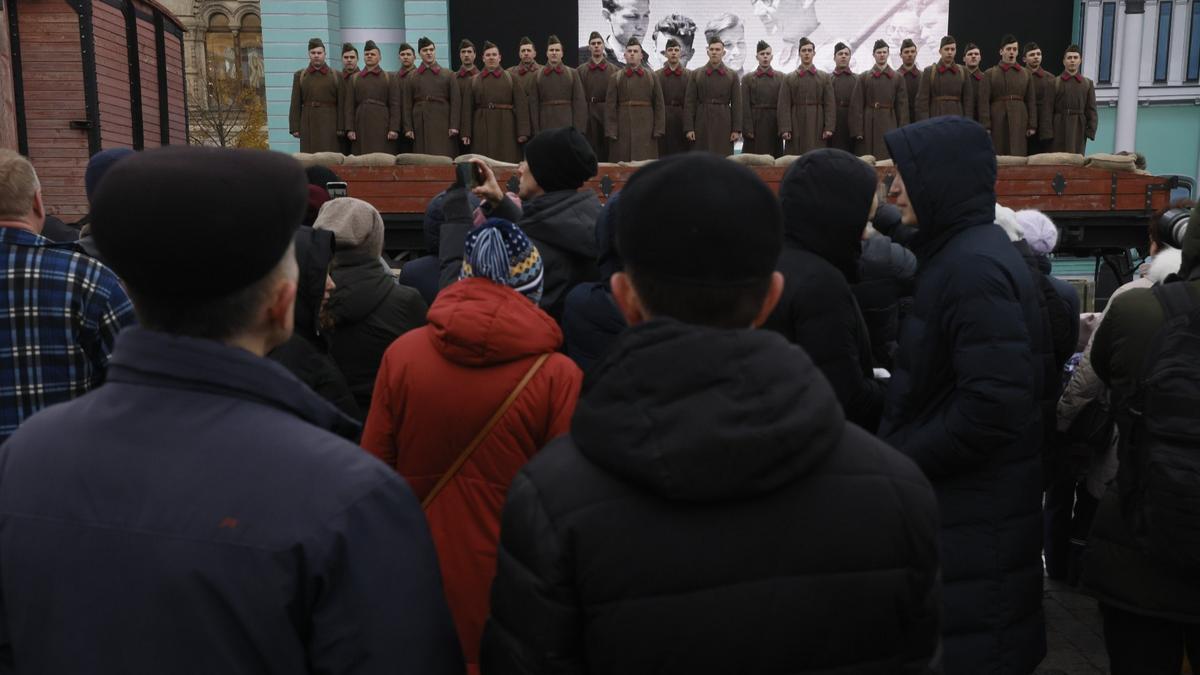In 2022, the world is facing a new wave of political instability: the war in Ukraine, a series of regional conflicts, protests in Iran and China. Since the 1980s, sociologist Jack Goldstone (currently a professor at George Mason University) has been looking for factors that could predict social and political cataclysms — primarily revolutions and the collapse of empires. We discussed with him why the level of interstate violence is growing in the world, how new revolutionary movements develop, and what will determine the dynamics of human societies in the coming decades.
Predicting wars
In your publications, you say that calculating the likelihood of certain historical processes and especially revolutions is quite easy. Would you say the same about wars? Is it possible to predict if a war is going to take place?

Jack Goldstone
professor at George Mason University and expert in social movements
No. And the reason for that is that wars can be started by a single individual who is the head of state. Revolutions, on the other hand, require coordination with lots of different groups and different conditions coming together. Revolutions only occur when a government is experiencing serious fiscal or military stress, when the elites have their own grievances against the regime and there are some elites who are willing to be leaders of the opposition. And when the population at large, whether it’s urban or rural coalition, has grievances that would motivate it to follow a revolutionary leader. All of those things can be assessed and measured.
But if you’re asking when countries will go to war, that becomes very much a decision of an individual leader. Most people did not expect Vladimir Putin to invade Ukraine because on any objective reading, Ukraine was such a large country, both in territory and population, that it was not likely to be the same kind of relatively easy victory that Russia had obtained in Georgia, Moldova or Syria.
It would clearly be highly risky at best. Most people were sceptical, but Mr. Putin decided it would be in his interests and in Russia’s interests to initiate a conflict and so he did.
Much the same is true in China. Whether or not the United States and China find themselves in a military conflict depends almost entirely on what Mr. Xi decides to do regarding Taiwan. If he decides that Taiwan must be forcibly incorporated into China, we will have a war. Whether it includes the United States simply as a supporter of Taiwan or as an active combatant against China.
The year 2022 brought us not only the war in Ukraine, but also a rise of other regional conflicts such as the Nagorno-Karabakh conflict, Serbia and Kosovo, Turkey and Kurdistan, Israel and Hamas, Kyrgyzstan and Tajikistan, China and Taiwan and so on. Do you feel like the number of regional armed conflicts has actually been rising?
That’s a very good question. We are having more conflicts. It’s one of many waves of conflicts we have seen in recent years. We had a big wave of conflicts at the end of the Cold War, in the early 90s, and we’ve had another wave of conflicts roughly since the 2008-2009 recession.
Kenneth Waltz makes an argument that the ultimate cause of war is a breakdown in the overarching relations amongst nations. So if the nations of the world are organised into alliances and peaceful relations, then that creates a framework of order and makes it more or less likely. But if countries are kind of in a state of nature with regard to each other, that is, they don’t recognise any overarching principles or authority, then you’re more likely to have war.
Waltz would say that I’m mistaken about the ability of individuals to start war, but I think it’s obvious that that does happen. But I do agree with him in believing that the frequency of wars across the world as a whole depends on the degree to which some countries are able to exert, either individually or together, a degree of hegemonic order that crosses national boundaries.
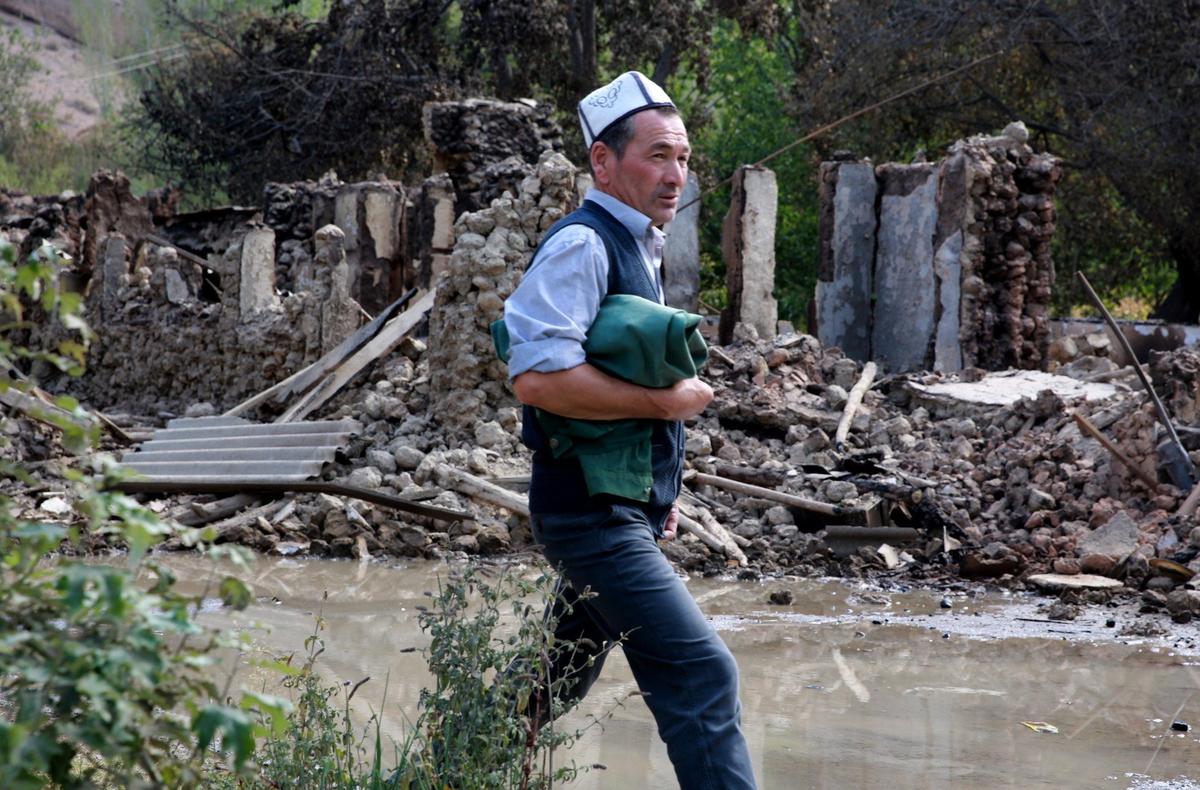
A Kyrgyz man inspects the damage on the Kyrgyz-Tajik border in the village of Kapchygay, 1000 km from Bishkek, Kyrgyzstan, on 21 September 2022. Photo: EPA-EFE / IGOR KOVALENKO
During the period from 1995 to 2010, the World Trade Organisation was getting up and running. China was joining. Russia was in the G7, the G20. When you had all the major powers of the world cooperating in international institutions that made wars less likely.
But since about 2010, that agreement has kind of broken down. In 2014, when Russia invaded Crimea, they became a pariah, they were tossed out of the G7 and they kind of stopped cooperating in the United Nations Security Council and so on.
We see a situation where the major world powers are no longer working together through major agreements or international institutions which opens the door for countries to say ‘If I want something, I’m going to have to get it myself. I’ll have to pursue it by aggression or war, because the international institutions are no longer working for my benefit’. I think we’ve seen a dissolution of global order in the last ten years that has promoted more conflicts.
The Armenia-Azerbaijan conflict grew up in the wake of the chaos created by the invasion of Ukraine.
Similarly, Asia and Africa have gone on in the belief that the West is not going to assure order. The West is busy in its conflicts with Russia and China. And so we need to promote our own interests.
I think you also see this, frankly, in the rise of authoritarian governments. Democracy during the period of global cooperation was kind of seen as the normal system that all good countries should adopt. And so you had a lot of countries in Africa adopt democratic institutions, maybe without much enthusiasm, but they thought that was necessary to be recognised as proper nations of the global system. Well, again, that’s no longer the case. And you see leaders in Africa trying to extend their terms or do away with their opponents. They no longer feel constrained to conform to democratic institutions because they see that that’s no longer dominating the world.
Even if wars do not become a mundane thing, countries all over the world are increasing their military budget. Is this economic shift going to have long-term effects?
It’s certainly going to have a long-term effect because the major investments we need for the long-term future of the world are in offsetting greenhouse gases and other climate-affecting solutions. It’s critical to clean up our planet. But those investments in climate mitigation obviously don’t get made if in the short-term, countries are investing in military equipment because they’re frightened about what conflicts might be on their doorstep.
So while, of course, all conflict is tragic, you look at the war, for example, in Ethiopia with Tigray, which has killed even more people than the war in Ukraine. Even aside from the deaths that we experienced today, we are storing up more pain and suffering in the future by failing to make the investments that we need to have a better future. Military equipment buys short term security, not a better future.
The war in Ukraine: impact on Russia and the world
You’ve argued that losing in a war could potentially lead to a revolution. What factors would need to come into play for a revolution to happen after Russia’s military failures in Ukraine?
A number of people have already said, looking at Russian history, that the revolution of 1905, which followed the Russo-Japanese War and the revolution of 1917, which followed World War One, might be examples of what is in store for Russia. The major difference is that revolutions in most countries today tend to be non-violent rather than violent.
So the type of revolutions that overthrew communist regimes in Eastern Europe and the Soviet Union is now the more typical pattern for revolutions around the world. Some people call these urban revolutions, some people call them non-violent or velvet revolutions. But the idea is that when you have a more mature population not dominated by young people, it is less likely for them to express their discontent through violence. They’re more likely to operate through large scale peaceful protests, occupying streets and squares in the cities.
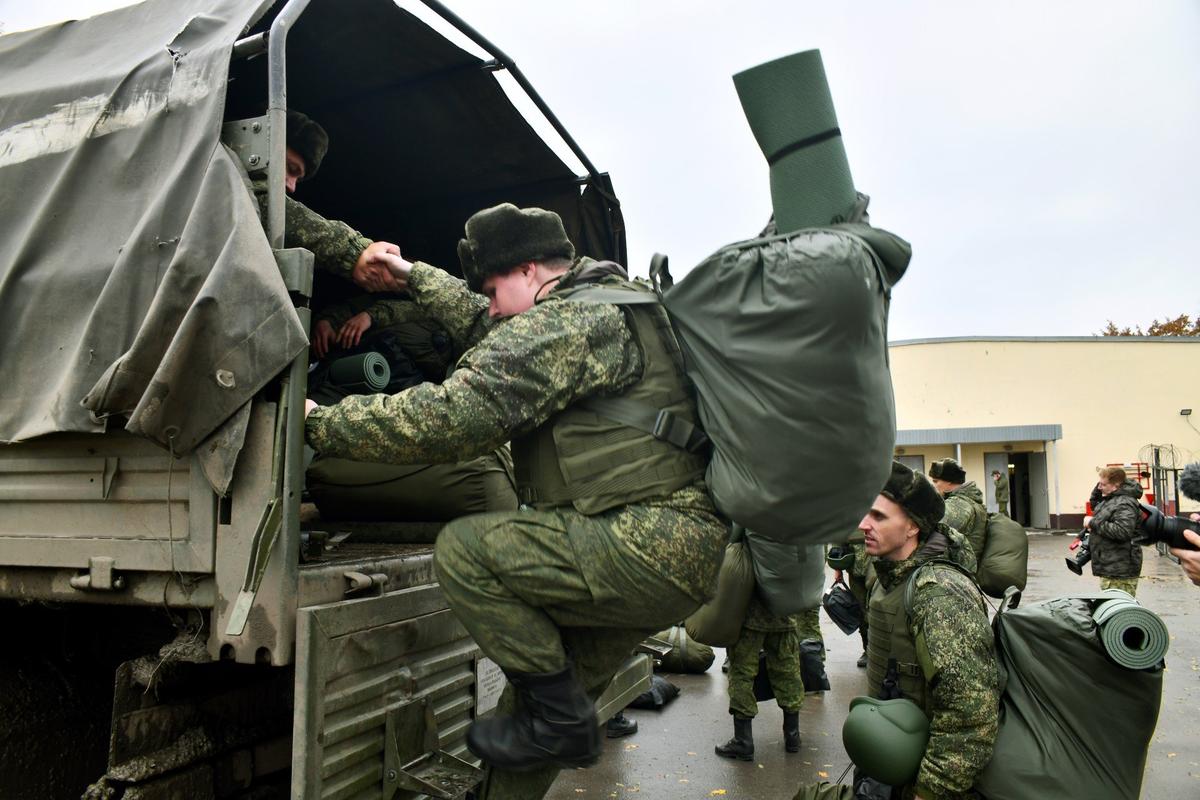
Conscripted citizens get into a military vehicle as part of the mobilization as military training continues within the scope of mobilisation in Rostov, Russia. Photo: Arkady Budnitsky / Anadolu Agency / Getty Images
Whether demonstrations lead to revolution depends on whether the government can count on the military to suppress protests once they reach a certain size. If protests are only a few thousands, they can be suppressed by the police. But if protests reach hundreds of thousands, that usually exceeds police capacity and you need the military to cooperate in putting an end to those protests. If the military is loyal to the regime and will exercise the necessary force, as we’re seeing unfortunately so far today in Iran, it’s very hard for a revolution to succeed, even if it begins in a promising way.
But in Russia… Will the military continue to prove loyal to Putin if Putin’s commands result in the destruction of the military?
You have a situation today where many of the frontline fighting units have been decimated in the war and much of the force that’s being created now are kind of rapidly mobilised civilians. Those people are not likely to shoot against Russian citizens demonstrating in the cities.
Now, I don’t think Russia will face a civil war because I don’t think even the conservative military would raise that kind of force. It’s more likely that there’ll be large protests in the cities. The police will try and suppress those, and that will involve some violence. If the protests grow, then Putin will have to call in the military and some of the military may go ahead and use extreme force against crowds.
It’s interesting you mentioned the term civil war yourself. Kostantin Sonin, Russian economist and professor at the University of Chicago, wrote an op-ed for us where he argued that a civil war (or a major unrest the way it was in the 90s) is inevitable in Russia when the government becomes even more unstable and war veterans come back from the frontlines, carrying discarded weapons. Do you agree with this argument?
I think there might be civil unrest but not a civil war, because a civil war requires two armies. It’s more likely that there’ll be large protests in the cities. The police will try and suppress those, and that will involve some violence. If the protests grow, then Putin will have to call in the military and some of the military may go ahead and use extreme force against crowds.
But I think some of the military will refuse and may even join the demonstrations. And then you may have some internal fighting. In 1990, the Air Force sided with the protesters who occupied the White House and other parts of the military and said ‘Well, if we’re not united, we’re not going to be able to deal with this.’ So I see something like that happening, kind of a fracturing of the military, which leads to an inability to suppress rapidly growing national protests.
One of the main narratives of the Russian propaganda is that Russia is fighting not Ukraine itself but NATO. Do you think this could be true, partially? Because without the help from NATO-member countries the situation on the frontline could be a lot different. And if so, is this situation any similar to the proxy-wars of the 20th century when the US and the USSR were practically fighting on the territory of a third country?
Yeah, I think the situation today is actually quite similar to what happened during the Cold War, and the best example for that is Vietnam. In the Vietnam War, Russia supplied a large amount of military material to the North Vietnamese and the United States provided not only military but its own soldiers [to South Vietnam].
Today it’s kind of reversed where the United States is providing material to Ukraine in the same way that Russia supplied military hardware to North Vietnam. But Russia has its troops on the ground and the United States does not. But the overall situation is very similar.
When Iraq invaded Kuwait, it was seen that way, as a violation of global norms against aggression. The United Nations empowered the United States and its allies to fight against Iraq to reverse that invasion. America’s goals were simply to expel Iraqi troops from Kuwait, not to go all the way back to Baghdad and depose the regime there.
I think that the goals of the West today are very similar. Russia invaded a neighbouring country, violated the norms against aggression. We cannot let that stand.
And so the goal is to help Ukraine expel Russian troops from Ukrainian territory. NATO’s not trying to depose Putin or invade Russia. It’s much like the Kuwaiti situation.
Putin has argued that it was necessary to attack Ukraine because NATO was going to use Ukraine as an advanced platform to attack Russia. That’s just simply not true. There’s no evidence of that. And frankly, there’s no evidence that Putin thought that before 2014.
The situation with Ukraine is a matter of the Maidan revolution. In 2014, Ukraine ended up with a regime that Putin felt was a threat, not a threat for NATO to use as a platform for invasion. But a prosperous democratic Ukraine would be a threat, providing an example of an alternative to Putin’s authoritarian kleptocratic rule. And it got worse when Zelensky was elected because Zelensky was an anti-corruption campaigner. And if he could be chosen to lead Ukraine and succeed, then that could really inspire people in Russia to seek change.
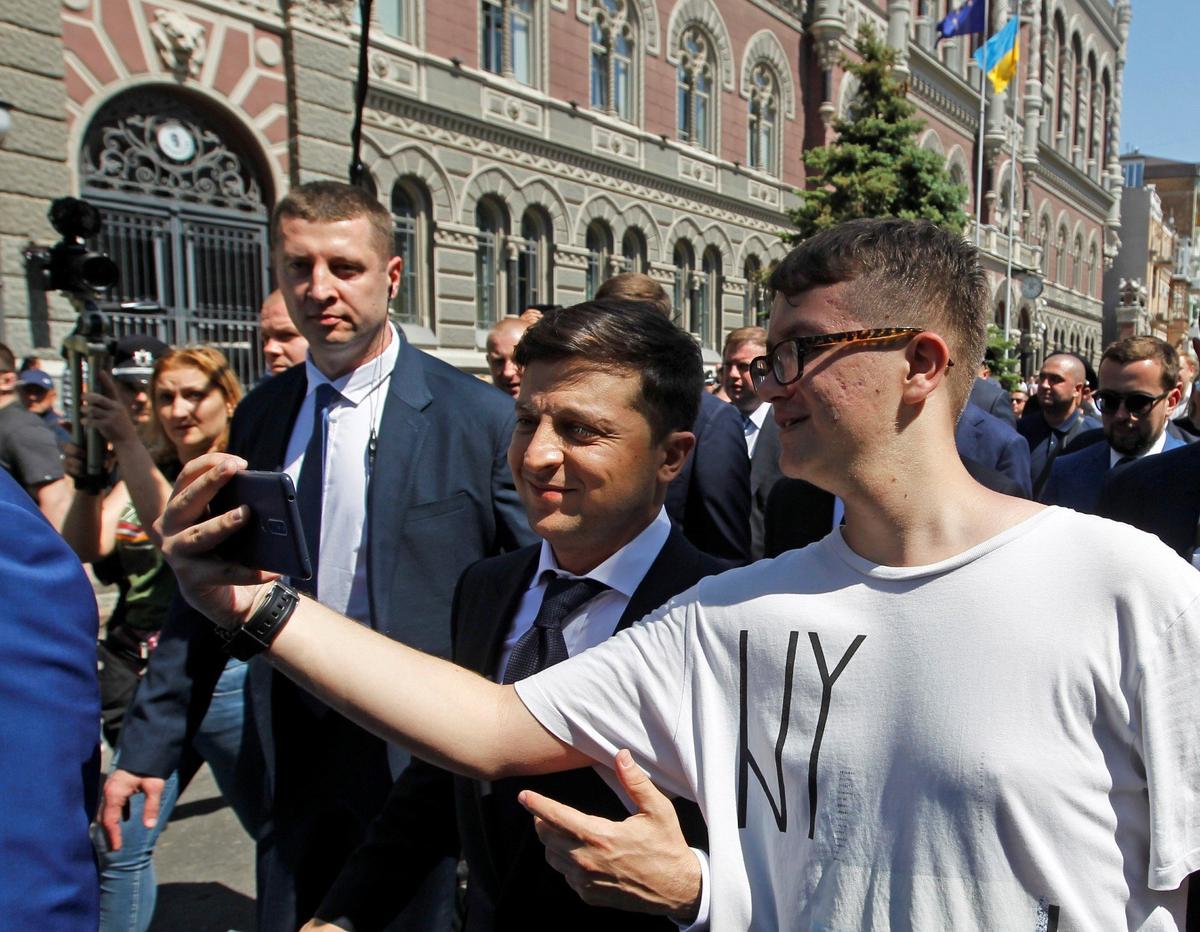
Ukraine's President Volodymyr Zelensky poses for photo as he walks to his Presidential Office after his inauguration ceremony. Kyiv, Ukraine, on May 20, 2019. Photo: Vladimir Shtanko / Anadolu Agency / Getty Images
Do you believe that nowadays, the stakes are even higher between Russia and the West than they were during the Cold War?
During the Cold War, we constantly were reminded to drill and prepare for an all out nuclear exchange. So the stakes of the Cold War were absolutely the highest possible. Both the US and the Soviet Union had even larger nuclear arsenals than they have today. They were on high alert almost all the time, and we lived with the constant fear that any mistake, whether it was over Cuban missiles or over something in Europe, could precipitate a massive nuclear exchange. So the stakes are not higher today, but the stakes are similar.
We worry about the onset of nuclear weapons use. Now, that’s more likely to begin with tactical nuclear weapons than with an intercontinental attack. But it’s still a threshold that we worry about and we never want to see crossed.
The stakes are high for the future, by which I mean heading off really severe effects of climate change will require global cooperation. And if Europe wants to remain confident and free, it must not have the constant threat of an aggressive authoritarian country biting off pieces of countries, as Russia has done with Ukraine, Moldova, Georgia, basically taking control of the Azerbaijan-Armenia conflict.
We need the war in Ukraine to end, and we need it to end with a Ukraine that feels free and secure. Anything else is going to put us into a world where everybody is investing in armaments. Everyone is worried about the next conflict, and we can’t deal with the challenges that will be critical 20 or 30 years from now in terms of whether we can even inhabit parts of the world that have millions of people today.
Iran’s protest case
Like I’ve mentioned before, you argued that revolutions could be predicted. Could you explain this a little further using contemporary Iran as a case study? What makes protests successful and what might they be lacking? It seems like protests nowadays form around things like women’s rights and generational gap. Does this stop the protests from growing larger?
Revolutions often begin with a fairly specific or narrow grievance. The Egyptian revolution of 2011 began with a protest march against excessive police brutality, particularly as it affected a few teenagers. So it’s perfectly reasonable to say a revolution begins on a narrow basis. The question is, does it grow to bring in a coalition that is larger and deeper than the initial grievance.
What’s happening in Iran is that we’re kind of still in the uncertain in-between: a protest that is still mainly by women about women’s rights and is still mainly gaining support from people under 30.
In order for that to become a revolutionary movement, it has to gain support both by people from age, say, 30 to 45, which is the largest population group in Iran, and it has to spread to other issues.
There are other issues, for sure. People in Iran are concerned about the corruption of the government. They’re concerned about the intrusive nature of religious and clerical rule, about the economic sanctions that seem to choke off future prospects for growth.
The difference is young people, who are under 30, have grown up with the Islamic regime and they probably resented it most of their lives and don’t feel any special attachment to it. But people who are in their 30s and 40s grew up in the early days of the Islamic Republic when it was still very much presenting itself as the saviour of national Iran against the satanic West. Add the West, frankly, shot down a civilian airliner and supported the Iraqis against the Iranians in the beginning of the war, so that the older generation grew up with a certain reverence and loyalty to the Islamic regime as having been the national protector.
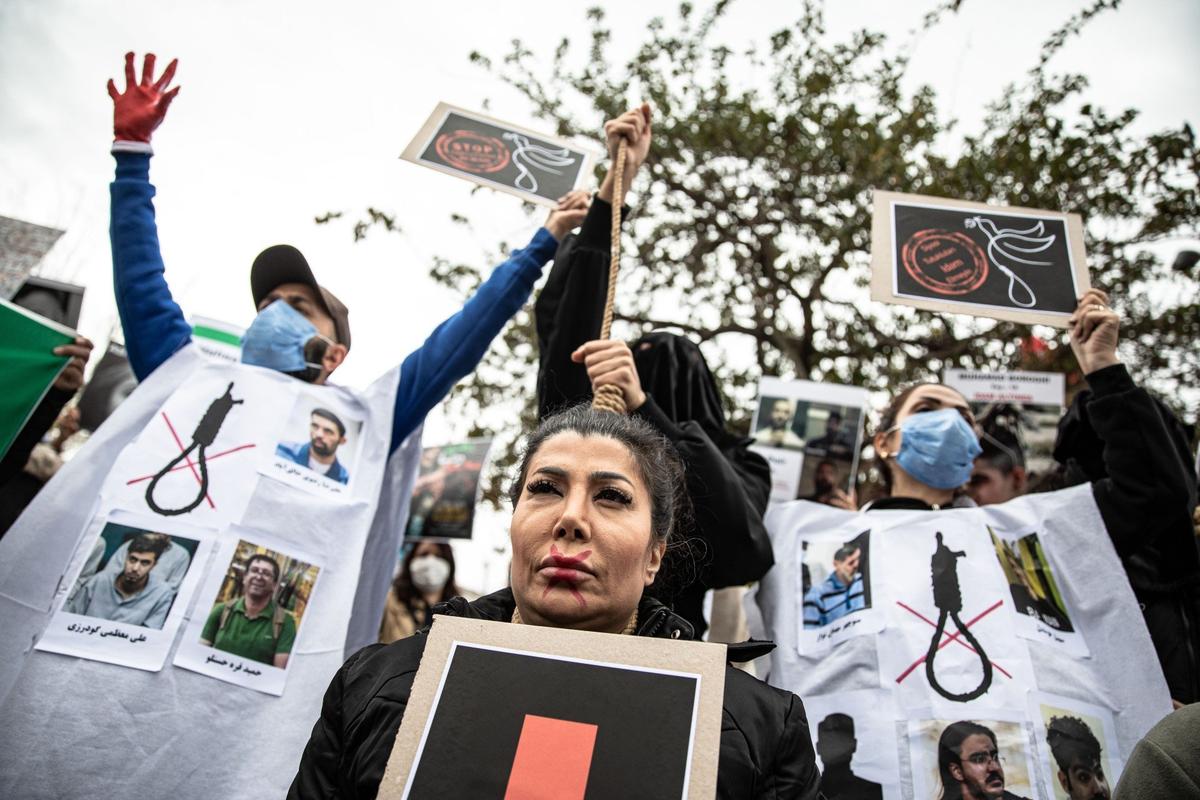
Protesters in Tehran, October 12, 2022. Photo: Onur Dogman / SOPA Images / LightRocket / Getty Images
In order for these older people to turn against the regime, it may require some more actions by the regime that will legitimise it. I heard that the Iranian military forces are using more violent attacks against protesters. That’s the kind of thing that might turn more people. They might say something like ‘Whatever our loyalty was to the Islamic regime, nowadays it’s become the type that would simply kill women and mothers, then we don’t want to support it anymore.’ It’s possible that by abusing its position and using excessive force, the government could create the kind of broader coalition that’s necessary for a revolution to develop. So what I would say is we can predict that we’re in a revolutionary situation in Iran, but so far it’s not clear that a full revolution will break out.
We discussed that the protests in Iran are centred around women’s issues and are led by women. Is it safe to say that we see similar tendencies in other parts of the world, that the protest has a female face nowadays?
It may be a general trend, but I don’t think it’s fair to treat it as something special. Throughout history, women have been important, if not the leading actors in revolutions. Women participated in the protests in Russia in 1905. It was a women’s march for bread in the French Revolution. Women often played a leading role in the protests outside the National Assembly, women played major roles in Cuba, Nicaragua.
What’s unusual in Iran and what might be the case, say, in Afghanistan in the future, is that you have a religious regime in which the restriction of women is part of the legitimating principle of the government. So it’s difficult for the regime to say ‘Okay, you’ve made your point, we will give greater rights to women, but we’re still going to run the country.’ Whether that can occur in a strictly religious regime this remains to be seen.
The government in Iran is already relenting. They’re not punishing women who go without a headscarf the way they would have done six months ago. They’re only punishing those who are protesting. So, you know, maybe if they suppress the protests, they will relent on some of the enforcement of the restrictions on women.
While we were working on the interview, Iranian authorities took a step back and said they would review the law that forced women to cover their head. Messages of the ‘morality police’ abolition have also started to appear in the media but it’s not fully clear yet if they are accurate.
Politics as usual
The World Cup in Qatar is on right now and it seems like the international community decided to turn a blind eye towards multiple human rights violations in the country because ‘football is not about politics’. The same way Western politicians and businessmen tried to sort of ‘avoid politics’ and made trade deals with dictators (including Putin and his close circle), which eventually led to the war. Do you think that maybe the international community needs to be more principled?
I would like to live in a world where morality always triumphs over private interests. But that’s not the world we live in. The world we live in is one where people are always making balances of trade offs between morality and their private interests.
If the world really stood for morality, nobody would deal with, for example, Saudi Arabia. After what Saudi Arabia has done in Yemen, what they did to journalists, including Khashoggi.
But there are private benefits from making deals with Mohammed bin Soliman of Saudi Arabia. People are always making these balances and trade-offs: ‘Is the private benefit worth more than my pride and my morality?’
The United States has a long history of working with immoral and unsavoury regimes. In a world of sovereign nations, for any one country to impose its morality on other countries is going to be difficult. So the question is what is the cost of doing so and is that cost reasonable and manageable?
The West is helping Ukraine not because of a moral condemnation of Putin, regardless of how much his war crimes and barbarity deserves it. We’re fighting with Ukraine because we believe it’s essential to protect the freedom of Europe and America. But it’s self-interest, not morality.
Should we expect a civil unrest in Europe as a result of some governments’ response to the war in Ukraine and their policies regarding the energy sector in particular? Could this strengthen the right wing-populists in Europe, the ones who fight for cutting support for Ukraine?
It’s disappointing to me that right wing politicians who claim that their freedom and national strength is important don’t seem to recognise that supporting Ukraine is critical for Europe. Now in Italy, Prime Minister Meloni is still a supporter of defending Ukraine against Russian aggression despite her history and identification with prior Italian fascism.
It’s clear that Europe will have to make sacrifices with regard to energy and such. Of course, it’s nothing compared to the sacrifices Ukrainians are making to protect their country. Human beings are capable of great selfishness and great sacrifice. It’s that kind of dual character of our nature.
We’ll give our lives for a cause we believe in, but we’ll also cheat our neighbours if we feel we can get away with it and it’s to our benefit.
So if the leaders of European nations want to persuade their countrymen and women that this is a time when sacrifice is necessary for a future that is as free and secure as it was in the last three decades that we enjoyed, then people can be persuaded.
So there’s an opportunity for opposition politicians to try and make something out of this. But I hope that those politicians who are advocating selfishness remain fewer in number and lesser in impact than the national leaders who are encouraging sacrifice.
In recent years, how has your assessment changed in regards to forecasting political processes? You’ve said it before that the demographics do not play such a major role anymore. But what does?
Demographic change, I think, has been and still is one of the major factors in predisposing countries to stability or instability. So I would say, for example, in sub-Saharan Africa, where you still have rapid population growth and very young populations, the risk of violent conflict is still high and still driven by that demographic pressure. Conversely, where demographic growth is slow or absent, conditions are better for achieving stable democracy.
Population is one major factor, and it tends to be more of a long-term predisposing factor rather than the dominant short term factor. In the short term, the tipping points of what direction conflict takes are set by patterns of relationships. Is the elite loyal to the regime? Is the military willing to suppress protests? Are people fearful or secure? Are they willing to protest for change or not? All of those things are not determined by demography, per se. They’re determined by more short term conditions and by the relationships amongst different groups.
If I looked around the world, I would say the long term trends are probably toward more political violence in sub-Saharan Africa and toward more democracy in Russia, China and Europe and even Latin America.
I think that by 2030, there’s a good chance that we’ll see democracy returned to Russia and by 2040, even the end of communist control of China. But we’re in 2022.
If you ask me what’s going to happen in the next five years… I would say we’re living in a world without consensus, without belief in the value of global order and overarching international organisations. So the next 5 to 10 years are going to be a bit more dangerous, chaotic. There’ll be risk of growth of authoritarian regimes. There’ll be risk of ethnic conflict. And there’ll be risk of wars. All of those will continue until we get a reconstruction of some kind of global cooperation between the major powers.
If the war continues to go badly for Russia and the Russian people decide they no longer want to have their young people fighting and dying in Ukraine, they could demand an end to the war. Putin could be asked by his military to take a retirement trip and enjoy his wealth. And you could have a new government in Russia that is determined to go back to the days of close relations with Europe, where Russia was involved in extensive trade, that the Russian elites had their property and their children and everything else engaged in Europe and European companies were investing and employing young Russians.
If Russia again follows the path of greater cooperation and integration with Europe, China will also come under more pressure not to be an aggressive rival of the West, but to enter a more cooperative competition and eventually, I think, come back toward agreements on climate and trade and intellectual property. So I could see the world becoming a better place ten years from now if things go well.
Join us in rebuilding Novaya Gazeta Europe
The Russian government has banned independent media. We were forced to leave our country in order to keep doing our job, telling our readers about what is going on Russia, Ukraine and Europe.
We will continue fighting against warfare and dictatorship. We believe that freedom of speech is the most efficient antidote against tyranny. Support us financially to help us fight for peace and freedom.
By clicking the Support button, you agree to the processing of your personal data.
To cancel a regular donation, please write to [email protected]
